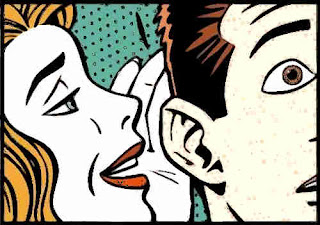
You know him only from seeing him around, know only about his reputation but somehow ever since you heard about his “niceness” he seems to be everywhere, why would that be?
It’s really no news that gossip, and what people say about other people influences the way we consider them and their behavior; what’s new is that it also affects how we actually SEE them.
Word goes that we see only what we want to see. And that’s what researchers Eric Anderson and Erika Siegel from Northeastern University (USA) set out to test by an experiment based on binocular rivalry.
What this means is that when each eye is to see a different image, the two compite and the brain decides which one dominates perception. Even though both are perceived by the eye only one will become consciously perceived, the other will be actively repressed by higher processing areas in the brain.
This process is really fast and fluctuates constantly from one image to the other (the same as when looking as those images that can either be a duck or a rabbit or a young/old woman…) but the persistence of each can be altered by changing parameters such as their intensity, contrast or by giving them an emotional value, for instance, a scary or disturbing face. In this case, what they observed was that a negative association also influenced the permanence of a given image, over neutral or even positive associations.
Given that negative information is learned faster and easier than positive/neutral, the researchers had to control that learning of faces asociated to positive and neutral information was equivalent to the negative. The kind of information, that is,the gossip, was of a social kind (the usual: X is having an affair with Y whereas Y is really in love with Z and all happening in the office…) for the negatively associated images whereas for the others it was socially irrelevant (X opened the window).
What they found, in conclusion, was that attention focused more on faces associated to negative gossip but that information had no effect whatsoever when it was not of social relevance (no one would be interested in Brad Pitt’s breakfast preferences, right?).
It’s pretty clear that what we see it’s not just what’s in front of our eyes, it is obvious froma structural point of view, since the eye has a blind spot the brain needs to fill in; but it is also since our sensory experiences highly depend on our subjective experiences. Each sensory experience is the sum of both what we see/hear/taste..plus our expectations, past experiences…and that’s why there are illusions. Like magic.
What can we really learn from this study? I see no biological excuse in it for theyellow press but it is true it makes sense that since we cannot know first hand everyone around, and it is vital (or at least it was, historically) to know who can be a potential enemy. So, careful with gossip. Now you know: YOU ARE IN THE SPOTLIGHT!
If you have liked this post, vote for it in OpenLab2013!